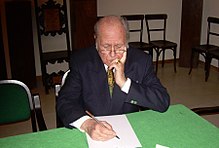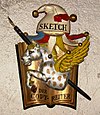Fritz Riha
Fritz Rihacek (born December 28, 1921 in Vienna ; † December 17, 2016 there ) was a Viennese journalist, cabaret artist, writer and radio presenter who became known under his stage name Fritz Riha .
Life
Fritz Riha graduated from high school in 1941, afterwards he had to join the German armed forces from 1941 to 1945 ( flown out wounded from Stalingrad ), in 1945 he was taken prisoner of war on the western front and did not return to Vienna until 1946. From 1947 to 1950 Riha worked as a freelance worker for the newspapers Bild-Telegraf and Neues Österreich (local editorial office and glosses on politics and society), where his talent for “sharp pens” was already evident. In 1950 his career as a cabaret artist began with the “Wiener Werkel”. When he returned to Vienna in 1962 (at the end of his last tour), he happened to meet an old friend who immediately had a new job in store for him. He became PR manager and advertising manager at Almdudler- Klein (including looking after prominent company guests at the 1964 Winter Olympics in Axamer Lizum and at the International Garden Show in the Danube Park ). He also worked for the Austrian Broadcasting Corporation , where he wrote and moderated many programs. In 1971 he moved to ARBÖ as head of press, where he stayed until his retirement in 1981, but worked as a consultant in advertising until 1991.
After returning home from Stalingrad, Gertrude was married at war in 1943, and this resulted in two daughters, two granddaughters and four great-grandchildren; the first woman died.
While on vacation in Vienna in 1954, he met his future second wife Inge († June 2012), whom he married two years later - also again in Vienna. From then on she accompanied him on his tours, even when his son Manfred was born in 1956. The family was the reason for him to finally give up the "life out of the suitcase". Son Manfred Riha has followed in his father's footsteps; his second job is radio commentator at Radio Arabella (Austria and southern Germany). Manfred's daughter is Fritz Riha's third granddaughter.
Fritz Riha died on December 17, 2016 in the Alsergrund nursing home shortly before his 95th birthday.
Artistic career
Cabaret "Wiener Werkel" from 1950
In 1950, director Eduard Geiger from the cabaret "Wiener Werkel" was looking for a copywriter for the first program of the new troupe. He asked Fritz Riha, who had noticed him through his feature articles, to try his hand at it and he wrote: “... that's how the boys twitter!” The premiere was in the Theater im Zentrum in Liliengasse, and in 1953 they moved to the Schwechater Hof. The young cabaret artists of 1950 saw themselves as the successors to the legendary socio-critical and political cabaret "Wiener Werkel" (1939–44), hence the program title, derived from the saying: "As the old sing, the young chirp!"
14 days before the premiere, an actor dropped out and director Geiger asked Fritz Riha to step in. It was also his first ever stage appearance. Colleagues at the beginning were Elsie Kalista (later Soubrette at the Grazer Oper), Maria Kieslich, Ossy Kolmann and Bruno Dallansky ; In the course of time, Tilla Hohenfels , Carlo Böhm , Franziska Kalmar (wife of Fritz Muliar ), Fred Weis, etc. a. to. In 1953 the troupe played in Munich, where they replaced another Viennese ensemble - "The Little Four" ( Gunther Philipp , Peter Wehle , Fred Kraus and his wife Hilde Berndt ). This guest performance was the beginning of a 10-year tour across Germany, Switzerland and Austria, Fritz Riha wrote 14 full-length cabaret programs for it.
The venues were in Austria Vienna ( Etablissement Ronacher ), Graz , Linz , Klagenfurt , Villach , Salzburg and Innsbruck , in Germany among others Berlin (Tusculum), Munich (14 times Hofgarten Games Annast), Frankfurt am Main , Hamburg and Stuttgart , in the Switzerland Zurich and Basel .
There were also over 30 appearances in baths and health resorts, e.g. B. ( Bad Oeynhausen , Bad Reichenhall , Bad Aibling ); Radio broadcasts of the program in Germany, in 1955 a television appearance by the ensemble in Switzerland and in 1957 in Germany on ARD under the leadership of Südwestfunk .
In 1962 he said goodbye to the “Wiener Werkel” and returned to Vienna.
His successor in the remaining "Wiener Werkel" ensemble with Fred Weis and Tilla Hohenfels was Felix Dvorak .
The program
The sketches and vocal numbers performed with typical “ Viennese humor ” and in Viennese dialect were the hallmarks of the troupe. Fritz Riha's specialty was the initially harmless sounding text, but satirical and maliciously charming, showing the big and small weaknesses of the “people like you and me”.
- “Above all, Fritz Riha must be mentioned here with praise. The comedy of confusion on the racecourse, the story of the plus-quamperfect waiter who knows everything in advance, are great feats of cabaret that draw attention to Riha as an inventive cabaret writer and versatile actor [...]. "
- "The secret of this amusing ensemble lies in the happy combination of lively, accurate texts - Fritz Riha always writes them himself - and a very precise, finely dosed direction, [...]"
- "Fritz Riha's vital masculinity is only surpassed by his little head, which apparently produces all Wiener Werkel texts with ease [...]."
Among his most successful numbers were " Graf Bobby and Graf Rudi" ( Faschingskrapfen 1957, A Brettl, a gführiger Schmäh 1958, Servus Berlin 1960, etc.), the Hamlet parody "Sag es mit Shakespeare" ( Walked in 1961, Capriolen 1961) the grand finale in tails à la "Fledermaus" ("Murder in 3/4 time"):
- "Duidu, duidu, toast to a glass of wine - duidu, duidu, put a drop of poison in it,
- duidu, duidu, what could be nicer - duidu, duidu-duidu, duidu, folks, so samma stop,
- whether Shakespeare likes it is not so bad, because we play Hamlet like that. "
and the series "Im Stammcafé" ( Where to take and not to steal 1962), where regulars Abeles (Weis) and Epstein (Riha) discuss:
- Epstein to Abeles: "When you would have seen Moses, he would have issued an eleventh commandment: 'You shall not look like Abeles!'"
Radio from 1962
Riha wrote and moderated the following radio broadcasts on Radio Wien - in front of an audience and broadcast live - (contributors included Maxi Böhm , Fritz Muliar , Ossy Kolmann, Guido Wieland , Helli Servi , Brigitte Neumeister , Günther Frank , Walter Niesner and Kurt Sobotka ), musical accompanists were Herbert Seiter and Norbert Pawlicki .
- 400 episodes “Im Konzertcafé”: Fritz Riha presented the life and music of various composers, performed alternately by the orchestras Franz Zellwecker and Heinz Sandauer ;
- 300 episodes “Austrians over Austria”: Interviews with celebrities, such as Federal President Rudolf Kirchschläger , union president Anton Benya or the behavioral scientist Prof. Otto Koenig - the “Austrian family” (Wieland-Servi-Riha) commented on the conversations in a cheerful manner;
- 300 episodes “Do not despise the masters for me”: Here he presented various craft professions and had them examined by the “experts” Neumeister-Frank-Riha, also pointedly;
- For eight years he played the head waiter with Ossy Kolmann in the show “Motorists on the move” in the sketch “Der Herr Montag”.
Motto of life
- "It's an uplifting feeling to be a genius - and to be the only one to know!" ( MARK TWAIN )
- "I only play texts I have written myself - I don't like witty things !" (FRITZ RIHA)
Awards
- Gold Medal of Merit of the Republic of Austria on October 18, 1979
- Professional title of professor awarded on September 14, 1983
- Silver Medal for Services to the State of Vienna on May 19, 1992
Works
- Fritz Riha (ed.): Count Bobby jokes. Schuler-Verlag, Stuttgart 1963, 3 editions, 52 pages.
- Fritz Riha: The old Viennese café house. Festungsverlag , Salzburg 1967, 227 pages.
See also
Web links
Individual evidence
- ↑ Part of Prof. Fritz Rihacek (on trauerportal.at) ( Memento of the original from December 30, 2016 in the Internet Archive ) Info: The archive link was automatically inserted and not yet checked. Please check the original and archive link according to the instructions and then remove this notice.
- ^ Arbeiterzeitung , Abend , September 26, 1952, Wiener Kurier , Neue Tageszeitung , Weltpresse , September 27, 1952.
- ^ New Austria , September 6, 1953, Weltpresse , September 7, 1953, Wiener Kurier , September 8, 1953, Presse , Kleines Volksblatt , September 9, 1953.
- ↑ Österreich-Lexikon zu "Wiener Werkel" (accessed on July 3, 2012)
- ↑ Süd-Ost-Tagespost , Neue Zeit , March 28, 1954.
- ↑ Linzer Tagblatt , O.Ö.Nachrichten , Linzer Volksblatt , October 24, 1956.
- ^ Neue Zeit Klagenfurt , Kleine Zeitung Klagenfurt , March 8, 1953.
- ↑ Berlin Program , Issue 12, published by Verkehrsamt Berlin, April 21-30, 1961.
- ^ Süddeutsche Zeitung December 18, 1953, Abendzeitung , December 23, 1953, Münchner Merkur , January 11, 1954, Süddeutsche Zeitung , March 12, 1956.
- ^ Zürcher Tageszeitung , April 6, 1957, Neue Zürcher Zeitung , Die Tat , April 7, 1957.
- ^ Basler Nachrichten , September 2, 1955.
- ^ New Austria , October 13, 1953.
- ^ Evening newspaper Munich, December 1959.
- ↑ 8 Uhr-Blatt Munich, January 11, 1962.
- ↑ Motorists on the move: prominent speakers remember [1]
- ↑ at Amazon [2]
| personal data | |
|---|---|
| SURNAME | Riha, Fritz |
| ALTERNATIVE NAMES | Rihacek, Fritz (real name) |
| BRIEF DESCRIPTION | Austrian writer and cabaret artist |
| DATE OF BIRTH | December 28, 1921 |
| PLACE OF BIRTH | Vienna , Austria |
| DATE OF DEATH | 17th December 2016 |
| Place of death | Vienna , Austria |



